355 Search Results for assessment
July 17, 2024
by Carole Zangari -
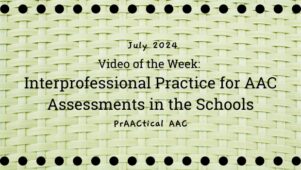
Learn about effective practices in multidisciplinary AAC assessment in schools from Dr. Jill Senner and Matthew Baud. Today’s featured video is an archived presentation from the 2024 AAC in the Cloud Conference, founded by CoughDrop. Many thanks to Jill, Matt, and the AAC in the Cloud team for making this important session available. Direct Link to Video – https://www.youtube.com/watch?v=z7h4bVbuNtk&ab_channel=CoughDrop
February 15, 2024
by Carole Zangari -
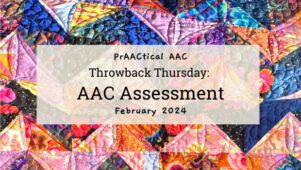
Looking for information on AAC assessment? Here are some past posts that may be of interest. Considerations in Switch Assessment Improving Assessment Practices for Students Who Use AAC: Mobilizing the Power of Social Narratives AAC Assessment for People with Aphasia Feature Matching in AAC Assessment
June 14, 2023
by Carole Zangari -
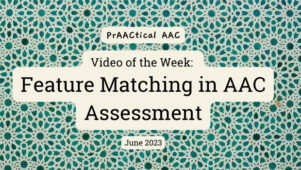
For several decades, the feature matching process has been the gold standard for selecting AAC devices. In today’s featured video, we learn about this from Katie Threlkeld, of Forbes AAC. This recorded session is part of the pre-conference offering in the AAC in the Cloud conference, a wonderful online event hosted annually by CoughDrop. If you haven’t registered for this year’s AAC in the Cloud conference, you can do that here. Many thanks to the fine team at CoughDrop and to Katie for this helpful presentation. Direct Link to Video – https://www.youtube.com/watch?v=n-_9WxCK7b8&ab_channel=ForbesAAC
June 16, 2022
by Carole Zangari -
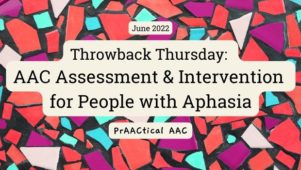
June is Aphasia Awareness Month, so we’re reprising some past articles and videos on supporting people with aphasia through AAC. When Language Is Lost: AAC Supports for Individuals with Aphasia Making It Work: 6 AAC Strategies for People with Aphasia Low Tech AAC for Adults with Aphasia: What Does That Mean? Bridging the Gap: Helping People with Aphasia to Compensate for Their Language Difficulties Aphasia, Supported Communication, Written Choice Strategy, + Variations 5 Questions about Aphasia & Communication Books A Fresh Look at AAC & Aphasia with Dr. Kristy Weissling Communication Books & Aphasia Aphasia & Supported Communication: What’s Volunteering Got to Do With It? AAC Assessment for People with Aphasia AAC & Aphasia: Resources in Support of National Aphasia Awareness Month Video of the Week: Life Participation & AAC Device Personalization for Adults with Aphasia Video of the Week: AAC & Aphasia
February 9, 2022
by Carole Zangari -
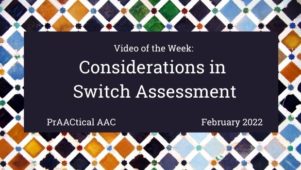
How can we support the alternative access needs of individuals who aren’t all that eager to engage in the assessment process? Occupational therapist Michelle Lange shares her thoughts and tips in this archived webinar from AbleNet. You can access the handout for this presentation here. Many thanks to Michelle and to AbleNet for this helpful content. Direct Link to Video – https://www.youtube.com/watch?v=VCRPhnXSo50&ab_channel=ableUOn-demandProfessionalDevelopment
January 6, 2022
by Carole Zangari -
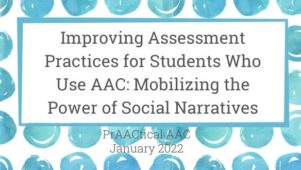
Social narratives are an empirically supported intervention that can be helpful in supporting people with AAC needs. They are commonly used to help individuals with autism understand and deal with challenging situations such as fire drills, birthday parties, and trips to the dentist. All types of social narratives can be written in text alone or include pictures and illustrations. Social Stories are a particular kind of social narrative that have a specific set of guidelines for their development and use. The originator of Social Stories, Carol Gray, defines Social Stories this way: “A Social Story accurately describes a context, skill, achievement, or concept according to 10 defining criteria. These criteria guide Story research, development, and implementation to ensure an overall patient and supportive quality, and a format, ‘voice’, content, and learning experience that is descriptive, meaningful, respectful, and physically, socially, and emotionally safe for the Story audience (a child, adolescent,... [Read More...]
July 22, 2021
by Carole Zangari -
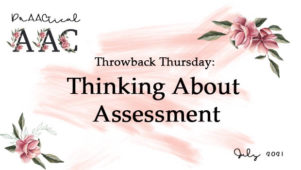
Need some tips for conducting good AAC assessments? Today we look back at some detailed posts on AAC assessment practices from Vicki Clarke’s series, AAC Assessment Corner. Enjoy! Ready, SETT, AAC Evaluate! AAC Skills Assessment for Direct Selectors Standardized Tests For AAC Users AAC Assessment for Emergent Communicators The Eyes Have It-Assessment Considerations for High Tech Eye Gaze Access Is AAC Feature Matching Still Relevant? Thinking Inside the Box for AAC Evaluations Procedural Resources Evaluating Skills for Use of Comprehensive AAC Dynamic Display SGDs Language Representation Elements – Noun Symbol Use for Functional Communication
March 4, 2021
by Carole Zangari -
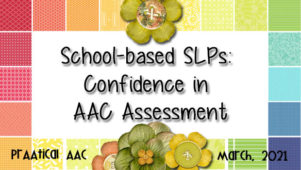
Many practicing SLPs had limited opportunities to learn about the practice of AAC during their graduate studies and even those who did probably had insufficient training and mentorship in doing AAC assessments. In this post, guest author Dr. Eric Sanders, Assistant Professor at Moravian College, discusses his research on how school-based SLPs feel about evaluating students who need AAC devices. School-based SLPs: Confidence in AAC Assessment As a former school-based SLP AAC specialist and current researcher, one of the things that I am interested in is trying to determine ways to better understand how services are provided to students who require AAC in schools in order to figure out ways to ultimately improve those services. One of the areas that has received little research interest in school-based AAC services is assessment and feature matching. There are a few likely reasons for this. AAC assessment can be very complicated,... [Read More...]
December 3, 2020
by Carole Zangari -
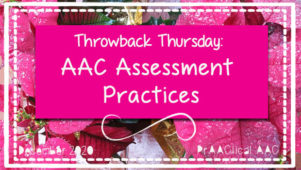
Welcome to another Throwback Thursday. Join us as we look back at some detailed posts on AAC assessment practices from Vicki Clarke’s series, AAC Assessment Corner. Ready, SETT, AAC Evaluate! AAC Skills Assessment for Direct Selectors Standardized Tests For AAC Users AAC Assessment for Emergent Communicators The Eyes Have It-Assessment Considerations for High Tech Eye Gaze Access Is AAC Feature Matching Still Relevant? Thinking Inside the Box for AAC Evaluations Procedural Resources Evaluating Skills for Use of Comprehensive AAC Dynamic Display SGDs Language Representation Elements – Noun Symbol Use for Functional Communication
September 17, 2020
by Carole Zangari -
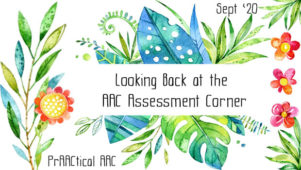
It’s Throwback Thursday and today we’re turning our attention to assessment. Take a look at these posts from our AAC Assessment Corner series guest authored by Vicki Clarke. Evaluating Skills For the Use of Comprehensive AAC Systems – Core Word Use Ready, SETT, AAC Evaluate! AAC Skills Assessment for Direct Selectors Standardized Tests For AAC Users AAC Assessment for Emergent Communicators The Eyes Have It-Assessment Considerations for High Tech Eye Gaze Access Is AAC Feature Matching Still Relevant? Thinking Inside the Box for AAC Evaluations Procedural Resources Evaluating Skills for Use of Comprehensive AAC Dynamic Display SGDs Language Representation Elements – Noun Symbol Use for Functional Communication









